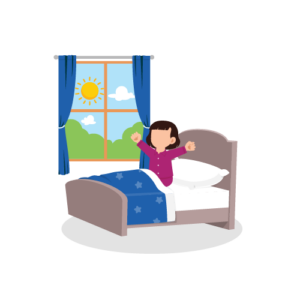 A good night’s sleep is essential for your child's growth, development and emotional wellbeing. Sleeping well helps your child:
A good night’s sleep is essential for your child's growth, development and emotional wellbeing. Sleeping well helps your child:
- have a better attention span and ability to learn and solve problems
- digest, reflect and store what they learnt in the day
- rest and repair their body
- support their immune system helping them fight off colds and other minor ailments
- be less irritable and better behaved.
Tips for better sleep
Help your child feel relaxed in the run up to bedtime. The Sleep Charity has some tips to make your child's bedroom environment calm as well as relaxation tips you can try with your child.
Families who might need further support
Bedtime can be extra tricky for those with additional needs. This may be because your child struggles to communicate how they’re feeling, or they may have sensory issues, heightened anxiety levels, or social cueing problems. Sometimes children with long-term illnesses or disabilities find it more difficult to sleep through the night. This can be challenging both for them and for you. Contact has more information about helping you and your child sleep. Scope also has sleep advice for parents of disabled children.
Families in Kent can access the ‘Understanding your child with additional needs’ online course. This looks at some particular aspects of parenting such as sleep and anger management, helping to make it easier to work with your child's behaviour as well as supporting their development. Go to ‘In Our Place’ and apply the access code Invicta to register for an account.
Kent School Health offers one-to-one support based on your child’s unique needs. Visit our special educational needs or neurodivergence pages for more information on the support available for you and your child.
Useful resources
- The Sleep Charity has more on supporting your child to have quality sleep.
- NHS.uk has some simple techniques you can try to help your child settle and stay asleep at night.
- Young Minds and NHS.uk have information on anxiety and worries, nightmares, night terrors and altered sleep problems.